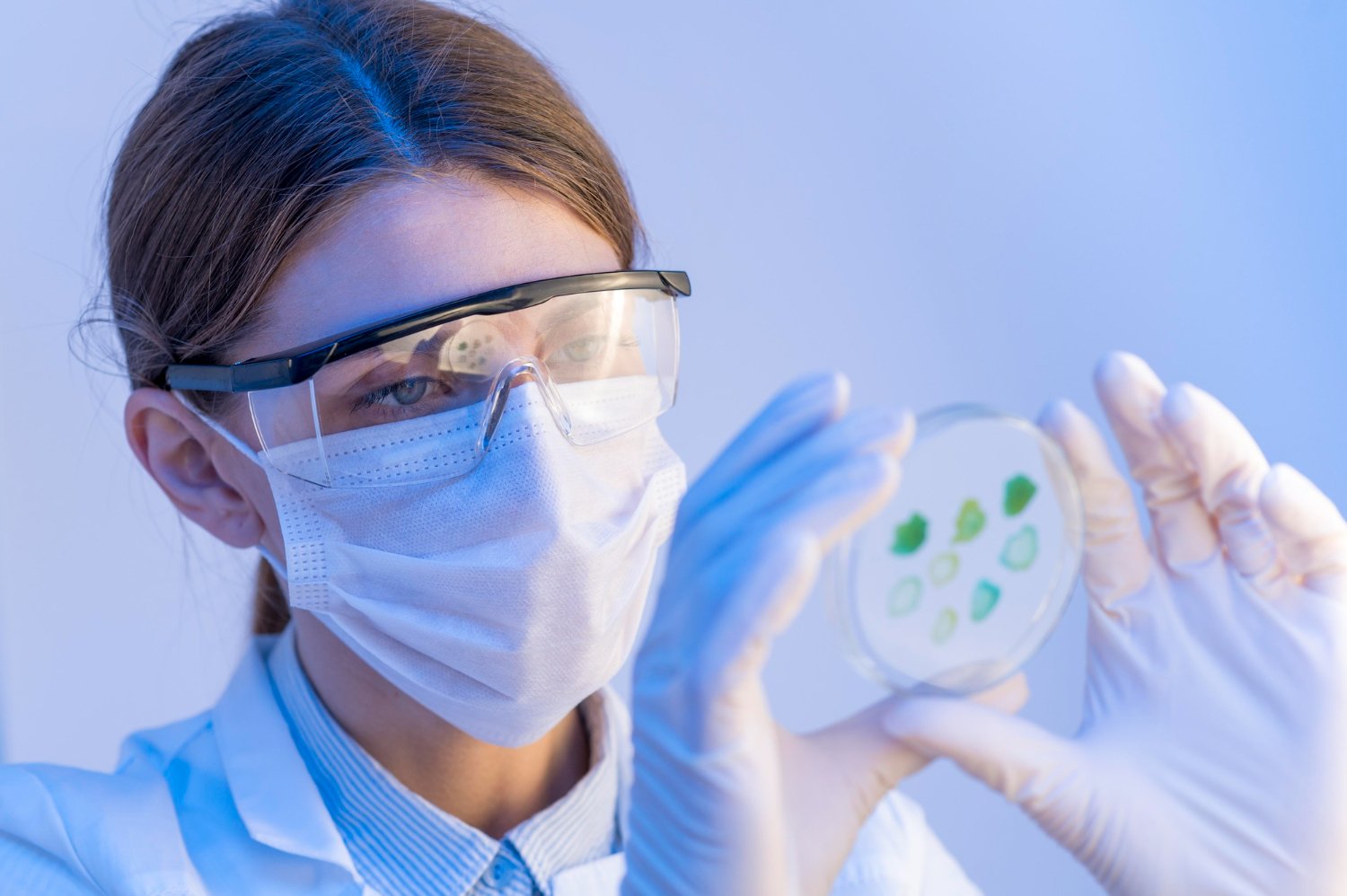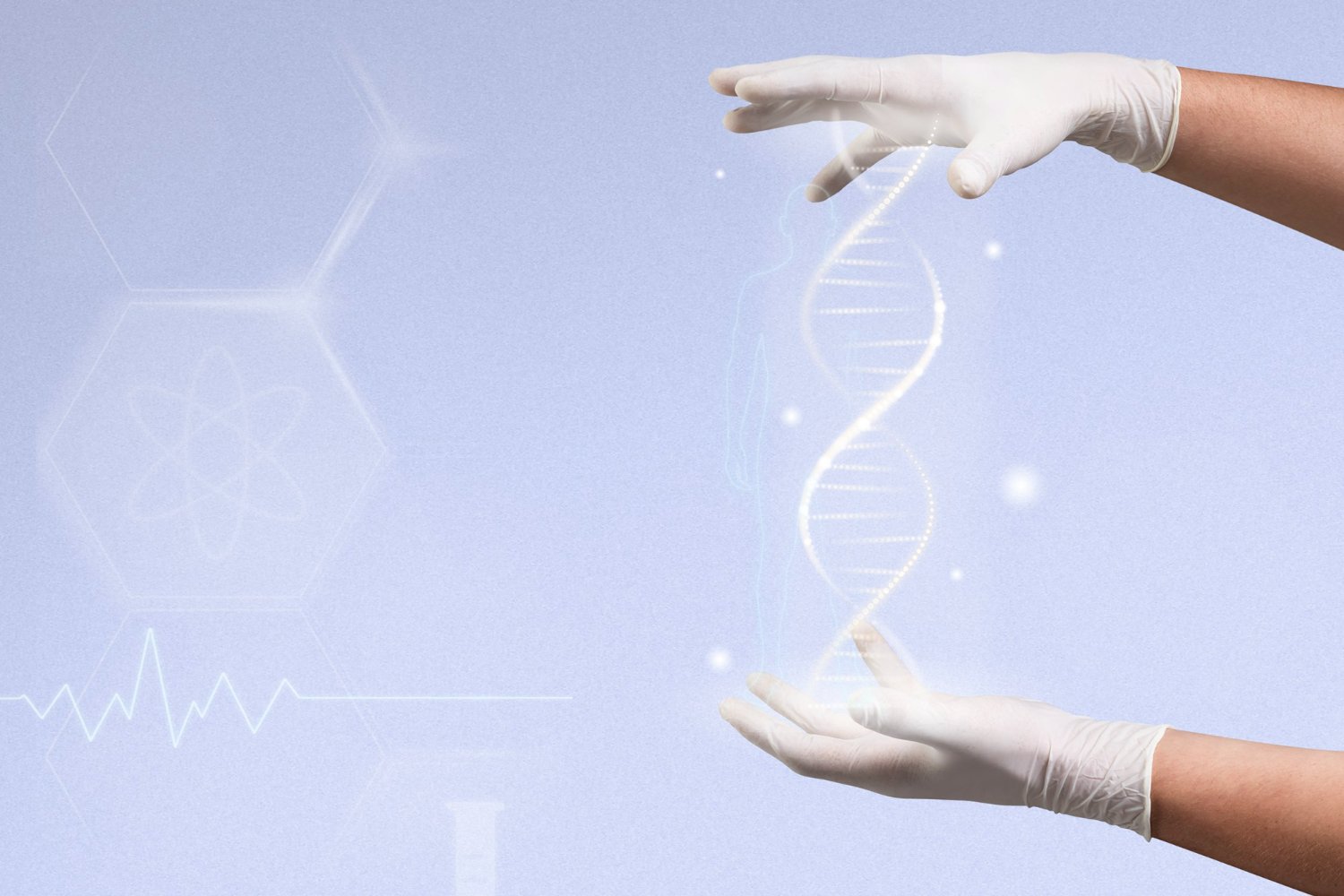
Introduction to CRISPR and Genetic Engineering
CRISPR technology, which stands for Clustered Regularly Interspaced Short Palindromic Repeats, has emerged as a groundbreaking tool in the field of genetic engineering. This innovative system enables precise modifications to an organism’s DNA, offering unprecedented control over genetic information. At the core of CRISPR’s mechanism is a guide RNA (gRNA) that directs the Cas9 enzyme to specific locations within the genome. Once targeted, the Cas9 enzyme creates a double-strand break in the DNA, allowing natural cellular repair processes to introduce changes—such as inserting, deleting, or altering genes.
Genetic engineering, also known as genetic modification, encompasses a broader range of techniques aimed at directly manipulating an organism’s genome. This field has seen significant advancements, especially in medicine, agriculture, and industry. For instance, in medicine, genetic engineering has facilitated the production of essential pharmaceuticals like insulin and gene therapies for genetic disorders. In agriculture, genetically modified crops have been developed to enhance resilience against pests and diseases, thereby improving food security.
Key players in this field, such as Jennifer Doudna and Emmanuelle Charpentier, have led the development of CRISPR, earning them the Nobel Prize in Chemistry in 2020. Their work exemplifies the potential of genetic engineering to reshape our understanding of biology and medicine. As we delve deeper into the ethical implications of these technologies, it becomes vital to consider both their transformative potential and the responsibilities they entail.
The Ethical Debate
The advent of CRISPR technology has sparked a significant ethical debate. While its potential benefits are vast, the ethical concerns surrounding its application cannot be overlooked. Experts highlight various issues, particularly in the realm of germline editing. Such edits pose profound ethical implications, as changes would be inherited by future generations. Most experts agree that human genome editing for reproductive purposes should remain on hold until deemed safe.
Risks
One of the primary risks involves safety concerns, including potential off-target effects and mosaicism. These unintended consequences may lead to significant health implications. Additionally, the issue of informed consent is complex, particularly regarding embryos and future generations. Parents may struggle to make fully informed decisions given the unknown risks involved.
Benefits
On the flip side, the potential benefits of genetic engineering are substantial. Advances in genetic research could lead to improved health outcomes, including therapies for genetic disorders and personalized medicine. Furthermore, genetic engineering holds the promise of agricultural advancements, producing crops that are more resilient to environmental stresses, thus enhancing food security.
As noted by Jennifer Doudna in her article published in Science (2015), “Genome editing raises profound ethical challenges.” This statement encapsulates the ongoing discourse surrounding CRISPR technology and its implications for society. The balance between innovation and ethical considerations is critical as we navigate this new frontier in genetic engineering.
Christian Perspectives
Psalm 139:13 states, ‘For you created my inmost being; you knit me together in my mother’s womb.’ This verse is a cornerstone in Christian theology regarding the sanctity of life. It emphasizes that God is intricately involved in the creation of each individual, affirming the belief that every person is uniquely crafted with intention and purpose. This divine creation underscores the inherent value of human life, suggesting that individuals are precious and known to God even before birth. For a deeper understanding, you can explore the interpretation of this verse here.
The imagery of God ‘knitting’ together a person highlights a personal and caring relationship between the Creator and the created. Such interpretations encourage believers to recognize their worth and purpose in God’s overarching plan.
However, the rise of genetic engineering, particularly through technologies like CRISPR, raises ethical questions about what it means to ‘play God.’ Some Christians view genetic engineering as a means to alleviate human suffering, advocating for its potential benefits, such as improved food security through genetically modified organisms. Yet, others argue that manipulating human embryos crosses a moral line, asserting that it could lead to unintended consequences that undermine God’s creative order.
Ethical concerns become even more pronounced when considering the implications of selecting genes deemed ‘negative.’ The idea of ‘designing’ humans poses risks not only to individual autonomy but also to the fabric of human existence itself. Thomas Willoughby emphasizes the need for caution, suggesting that while healing aligns with biblical principles, the distinction between helping and enhancing is crucial.
As Christians navigate these complex issues, they are urged to approach genetic engineering with discernment, weighing the potential impacts on humanity in light of scriptural teachings.
Jewish Insights
The Talmud, specifically in Sanhedrin 37a, discusses the profound concept of uniqueness in creation. This passage asserts that every individual is created in the image of God, suggesting that no two people are identical. This idea elevates the intrinsic value of each person, emphasizing that everyone has a distinct purpose and role in the world. The Talmudic interpretation encourages a deeper understanding of human dignity, highlighting the responsibilities that come from being a unique creation within the divine plan.
This focus on individuality underscores the significance of recognizing each person’s uniqueness as part of God’s design. In a world increasingly influenced by genetic engineering technologies, such as CRISPR and Preimplantation Genetic Diagnosis (PGD), these insights become even more relevant. Jewish authorities engage in robust debates regarding the ethics of genetic interventions. While the use of genetic engineering for medical purposes—particularly to treat hereditary diseases—is generally accepted, the ethical implications of non-medical enhancements raise serious concerns.
The potential for eugenics and the alteration of personal characteristics could threaten the diversity that is valued in Jewish thought. Many halachic authorities caution against using these technologies for enhancements, as it may be perceived as overstepping divine boundaries. Such perspectives reflect a broader ethical concern about the ramifications of altering what it means to be human. In Jewish thought, each individual is viewed as a unique expression of God’s creation, reminding us of the sanctity and dignity inherent in every life.
Islamic Views
In the context of genetic engineering, the Qur’an 95:4 states, “We have certainly created man in the best of stature.” This verse emphasizes the inherent dignity and excellence of human beings. It suggests that humans possess unique qualities that set them apart from other creatures, establishing a foundation for ethical considerations in the realm of genetic alteration.
The interpretation of this verse, particularly as highlighted by the Sahih International Translation, underscores the optimal form in which humans are created. Scholars like Abul Ala Maududi explain that this signifies not only physical attributes but also the nobility of thought and intellect. Thus, the dignity of humans is connected to their potential for moral and intellectual development, encouraging individuals to strive for excellence.
Islamic teachings generally adopt a favorable view toward human genome editing. The collaboration between Muslim religious scholars (ulama) and biomedical scientists has facilitated discussions on ethical questions arising from genetic modifications. This interdisciplinary approach aims to respect the inherent worth of individuals while exploring the possibilities of genetic research.
However, with the advancements in genetic alteration, ethical implications arise. The concern is that tampering with the divine creation could undermine human dignity. If genetic modifications are pursued without careful consideration, it could lead to a breach of the sanctity of life as suggested by Qur’an 95:4. Thus, while the pursuit of scientific knowledge is encouraged, the ethical responsibility to maintain human dignity remains paramount.

Buddhist Perspectives
In the realm of genetic engineering, the thoughts of Nagarjuna provide a profound lens through which to view the ethical implications of altering living beings. Nagarjuna, a prominent Buddhist philosopher, emphasized the principle of interdependence, which posits that all phenomena arise in relation to one another. This interconnectedness suggests that any modification of a being’s genetic makeup does not occur in isolation; it affects not only the individual but also the broader ecological and social systems.
Current practices in genetic engineering, particularly with technologies like CRISPR, can challenge this principle. For instance, altering the genetic structure of one organism could have cascading effects on various species, ecosystems, and even human society. The notion of manipulating the fundamental building blocks of life raises ethical questions about the potential consequences of such actions. If we modify genes to eradicate diseases, we must also consider the long-term impacts on biodiversity and the intricate web of life.
Moreover, the Buddhist view encourages a deep respect for all forms of life, advocating for a careful examination of our motives behind genetic modifications. Are we pursuing advancements for genuine benefit, or are we simply responding to our desires for control and perfection? This introspection is crucial as we navigate the ethical landscape of genetic engineering.
Ultimately, the teachings of Nagarjuna challenge us to reflect on our role in the natural world and to approach genetic engineering with caution and responsibility. As we explore these technologies, the principle of interdependence serves as a guiding reminder of the intricate connections we share with all living beings.
Hindu Philosophy
The Bhagavad Gita, a foundational text of Hindu philosophy, presents profound insights into human existence and the divine. In Bhagavad Gita 18:61, it is stated, “The Lord dwells in the heart of all beings.” This verse highlights the belief that the divine presence permeates every aspect of life, suggesting that human beings are not merely biological entities but are infused with a sacred essence.
This understanding of divinity raises important ethical considerations regarding genetic engineering and technologies like CRISPR. If the divine resides within each individual, then altering one’s genetic makeup could be seen as tampering with the very essence of what makes a person unique. Such actions might disrupt the delicate balance of life and the inherent worth bestowed upon each being by their divine connection.
Furthermore, the concept of divine presence implies that every individual is endowed with potential and purpose. The Hindu perspective encourages respect for all forms of life and emphasizes the importance of moral integrity in our actions. This philosophical backdrop urges us to consider the implications of genetic modifications not just from a scientific standpoint, but also from a spiritual and ethical perspective.
As we delve deeper into the realm of genetic engineering, the teachings of the Bhagavad Gita remind us that our actions should reflect a commitment to honoring the divine within ourselves and others. Thus, the pursuit of knowledge and advancement in genetics must be approached with caution, respect, and a profound awareness of the sanctity of life.
Nietzsche’s Philosophy
Friedrich Nietzsche, a profound philosopher of the 19th century, often explored the concept of surpassing humanity through his idea of the Übermensch or “Overman.” He posited that humanity should evolve beyond its current state, pushing the boundaries of moral and physical limitations. Nietzsche believed that traditional values and morality were constraints holding back human potential. He called for individuals to embrace their instincts and creativity, thereby achieving a higher state of existence.
This philosophy aligns intriguingly with contemporary discussions around genetic engineering and technologies like CRISPR. As we venture into the realm of genetic modification, the notion of surpassing humanity raises vital questions. Are we, in our quest for enhancement, genuinely transcending our limitations, or are we merely playing with forces we do not fully understand?
Nietzsche’s ideas invite us to reflect on the philosophical implications of genetic engineering. If we embrace the notion of the Übermensch, does this justifies altering our genetic makeup to create so-called “better” humans? Furthermore, what does this mean for our understanding of identity, individuality, and the very essence of what it means to be human? The ethical landscapes become complex as we consider the potential to manipulate not just our own genes but the genes of future generations.
In this light, Nietzsche’s philosophy serves as both a challenge and a cautionary tale. While the pursuit of improvement and evolution is inherent to humanity, we must tread carefully. The quest for the Übermensch should not lead us to disregard the intrinsic value of our current existence, nor the ethical implications of altering the fabric of life itself.
Francis Bacon’s Vision
Francis Bacon, a pivotal figure in the scientific revolution, laid the groundwork for modern scientific inquiry in his seminal work, New Atlantis. In this utopian narrative, Bacon envisioned a society where humans harnessed nature for their benefit, emphasizing the idea that knowledge and science could lead to human betterment. He argued that by understanding and shaping the natural world, humanity could achieve unprecedented advancements and enhance its quality of life.
Bacon’s vision underscores a profound responsibility: the ethical implications of manipulating nature. His belief that through science we could improve our circumstances invites a dialogue on contemporary technologies, such as CRISPR and genetic engineering. These innovations hold the promise of eradicating diseases and enhancing human capabilities, yet they also raise critical ethical questions about the limits of human intervention in nature.
Historically, Bacon’s ideas have resonated through the ages, influencing how societies approach scientific advancements. His optimism about human potential reflects a desire for progress, one that is echoed in current discussions about genetic modification. As we stand on the brink of a genomic revolution, we must consider whether we are merely playing with the building blocks of life or genuinely striving for a better future.
The intersection of Bacon’s philosophy and modern genetic engineering reveals a complex landscape. While there is immense potential for improving human health and well-being, it necessitates a careful examination of the ethical ramifications. As we navigate this new frontier, Bacon’s call to responsibly shape nature remains highly relevant, urging us to balance ambition with caution.
Fukuyama and Habermas
In his influential work, Our Posthuman Future, Francis Fukuyama raises critical concerns about the implications of biotechnology on human nature. He warns that advancements in genetic engineering and reproductive technologies could fundamentally alter what it means to be human. Fukuyama highlights the risk of creating a societal divide: those who can afford enhancements may gain significant advantages over those who cannot. He emphasizes the necessity of maintaining a moral framework to guide the application of these technologies, advocating for a cautious approach to safeguard humanity’s essential qualities.
On the other hand, philosopher Jürgen Habermas delves into the concept of autonomy in the context of genetic design. He argues that the natural variability of human genetics is fundamental to our self-understanding as moral agents. Habermas warns that intentional modifications to the human genome threaten this self-perception, undermining the notion of individuals as free and equal members of a moral community. He underscores the unpredictable nature of genetic inheritance as crucial for maintaining moral equality.
Habermas also discusses the shift from chance to choice that genetic interventions introduce. This transition could impose burdens on individuals, as they may live under parental expectations linked to their genetically predetermined traits. Moreover, the irreversibility of genetic modifications complicates the landscape, limiting individuals’ ability to distance themselves from their genetic backgrounds.
Both thinkers challenge us to reconsider the ethical dimensions of genetic engineering. Their insights compel us to reflect deeply on how such technologies could redefine human identity and relationships, ultimately shaping the future of humanity itself.
FAQ Section
What is CRISPR and how does it work? CRISPR, or Clustered Regularly Interspaced Short Palindromic Repeats, is a revolutionary genetic engineering technology that allows scientists to edit genes with precision. It works by utilizing a guide RNA to identify a specific DNA sequence in the genome, and an enzyme called Cas9 to cut the DNA at that location. This enables the deletion, addition, or alteration of genetic material.
What are the ethical concerns associated with CRISPR? The ethical concerns surrounding CRISPR primarily involve the potential for unintended consequences, such as off-target effects that could cause harmful mutations. Additionally, there are worries about equity in access to genetic enhancements, potentially leading to a societal divide between those who can afford such interventions and those who cannot, as discussed in Fukuyama’s work.
How might CRISPR affect human identity? CRISPR has the potential to alter human identity significantly. By allowing for genetic enhancements, it introduces questions about what it means to be human. Philosopher Jürgen Habermas argues that changes to the genome could undermine our self-understanding as moral agents, impacting our autonomy and individuality.
Is there a difference between therapeutic and enhancement uses of CRISPR? Yes, there is a notable distinction. Therapeutic applications aim to correct genetic defects and are generally considered ethically justifiable. In contrast, enhancement uses, which seek to improve human traits or abilities, raise more profound ethical dilemmas regarding parental expectations and societal implications.
What role do moral frameworks play in the use of CRISPR? Moral frameworks are essential to guide the development and application of CRISPR technologies. As Fukuyama emphasizes, maintaining ethical considerations is crucial to ensure that humanity does not lose its essential qualities in the wake of rapid scientific advancement.

Conclusion
The rapid advancement of genetic engineering and CRISPR technology presents profound ethical concerns that demand our attention. One of the most significant issues is the potential for unintended consequences, including off-target effects that could lead to harmful mutations. This uncertainty raises critical questions about the morality of altering human DNA, as emphasized by Francis Fukuyama, who warns of the risks associated with transforming human nature itself. Moreover, the disparity between those who can afford genetic enhancements and those who cannot could exacerbate existing inequalities in society.
Another pressing concern is the impact of genetic design on individual autonomy. Jürgen Habermas argues that intentional changes to the genome could undermine our self-understanding as moral agents. The shift from chance to choice may impose parental expectations on genetically modified individuals, complicating their sense of identity. The irreversibility of genetic alterations further complicates this landscape, as individuals may find it challenging to distance themselves from predetermined traits shaped by their genetic makeup.
Looking to the future, the trajectory of genetic engineering will heavily depend on the frameworks we establish to guide its application. As we stand on the brink of unprecedented scientific progress, it is vital to maintain a moral compass that prioritizes human dignity and equality. The conversation surrounding these technologies must continue, ensuring that we approach genetic design with caution and responsibility, safeguarding the essential qualities that define our humanity.
Contact us and grow with us. Connect with us on Youtube, Facebook, and LinkedIn.
We hope to see you soon!





Leave a Reply